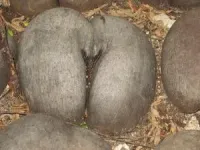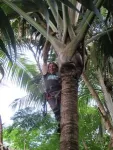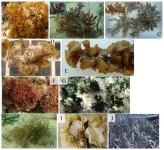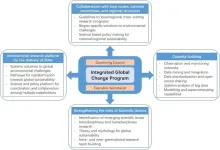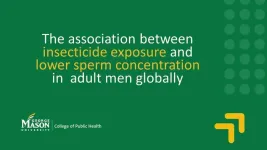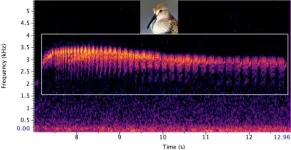(Press-News.org) Every tree species has its story. Unraveling all 73,000 of them is a significant undertaking for science, in no small part because a considerable proportion of tree biodiversity is tropical, rare, remote and subject to the ravages of deforestation. And an estimated 9,200 tree species have yet to be discovered.
Even trees well-known to science have mysteries. One is the Seychelles’ endangered coco de mer, or sea coconut palm tree, which is now relegated to parts of two small Indian Ocean islands and in decline. Only some 8,200 individuals remain.
What Lodoicea madivica lacks in range it makes up for in size, which frankly made it very hard for scientists – or anyone – to miss. Its seed can weigh up to 18kg. (Some reports say even heavier.) The seed’s size and “suggestive” shape probably made it popular with collectors and royal courts hundreds of years ago (the species is named after Louis XV of France). To this day, seed poaching for black market demand is a menace to the palm’s continued existence.
It takes a phenomenal tree to make a phenomenal seed, so it is little wonder the biology of the giant palm tree is fascinating. The coco de mer’s latest surprise, published in Scientific Reports, is that inbreeding doesn’t appear to be among its greatest threats, unlike many endangered species across the plant and animal kingdoms.
“Very little is ‘normal’ about the coco de mer, so our findings, though unexpected, perhaps shouldn’t be surprising,” said Chris Kettle, a co-author from the Alliance of Bioversity International and CIAT. “The results aren’t only important for conserving this iconic tree but may also prove important to the conservation and restoration of endangered trees elsewhere.”
Inbreeding euphoria
When tiny populations of a species try to survive, they don’t typically have much choice when mating. This can lead to weaker offspring, a symptom of what scientists call inbreeding depression.
Even though rare, female coco de mer trees don’t have a problem finding plenty of mates (and genetic diversity) to choose from. Several father trees pollinate them. Researchers found that offspring survival of Lodoicea improves when the parent trees are more closely related.
The researchers identified both parents for 139 trees in the study, finding that the robust young trees were more closely related than would be expected by chance. The findings suggest that female trees prefer closely related kin to sire their offspring.
The evidence points to the likelihood that coco de mer may suffer from outbreeding depression, the less common opposite of inbreeding depression, which has the same deleterious consequences for offspring.
“This study highlights the importance of understanding that the reproductive ecology of species as general dogma may not always apply,” said Kettle, who is also a researcher with the CGIAR Initiative on Nature-Positive Solutions.
Lodoicea’s absence of inbreeding depression may be due to several factors related to the species’ evolution in island isolation. The authors detail several in the paper, including “very rare” long-distance pollination events from long-lived trees that may be sufficient to maintain genetic diversity. Short-distance mating between related individuals is the norm.
Co-authors included researchers from ETH Zurich, the University of Exeter and the Seychelles Islands Foundation.
Mother knows best
The research holds several key lessons to preserve and restore populations of Lodoicea. Continued protection of the Vallée de Mai World Heritage Site on the island of Praslin, which is home to the largest stands of the palm, is critical, as is protection of the endemic gecko, which unpublished research by the Seychelles Island Foundation suggests is the tree’s most important pollinator. Similar protections should be extended to smaller sub-populations on the island of Praslin.
Hand pollination efforts should focus on exposing seeds to a broad range of pollen donors, including those near mother trees while planting efforts should emphasize placing fertilized seeds near the mothers.
While inbreeding is a severe threat to many plant species, the authors argue that Lodoicea’s reproductive strategy should not be dismissed as an oddball of island gigantism.
More research is needed, of course. Threatened populations of isolated or remnant tree species around the world could benefit from similar high-resolution genetic analysis of their offspring as it correlates to their fitness to discover the optimal distance between parent trees. For Lodoicea, researchers’ next steps could include figuring out how to successfully reintroduce the palm to areas where it was clear-cut centuries ago.
END
On two small islands in the Indian Ocean, an endangered palm with the world’s largest seed sows a lesson about landscape restoration
The endangered coco de mer boasts a seed that is the undisputed world heavyweight, weighing 18 kilograms (40 pounds) or more. A deep genetic dive into its reproduction strategy may hold a crucial lesson for the tree’s survival - and people restoring lan
2023-11-15
ELSE PRESS RELEASES FROM THIS DATE:
New scientific study reveals the crucial role of herbivorous fishes and sea urchins in restoring Caribbean coral reefs
2023-11-15
A new study by Dr. Lindsay Spiers (Florida Fish and Wildlife Conservation Commission) and Professor Thomas Frazer (College of Marine Science at the University of South Florida), published in PeerJ Life & Environment, presents crucial findings on the feeding preferences of herbivorous fishes and the sea urchin Diadema antillarum in Little Cayman. The study, titled "Comparison of feeding preferences of herbivorous fishes and the sea urchin Diadema antillarum in Little Cayman," sheds new light on the dynamics of these herbivores and their impact on the resilience of Caribbean coral reefs.
Caribbean coral reefs face significant challenges, ...
The Future of Future Earth: How global science programs can navigate the complex, shifting challenges in sustainability science
2023-11-15
The global change program Future Earth is an international alliance of organizations and agencies that was launched by the UN in June 2012. The Future Earth 2025 Vision identified eight global challenges for scientific research to accelerate progress in sustainability, improve collaboration, and mobilize resources.
After more than a decade of this global change program, researchers are analyzing the challenges Future Earth has faced and the path forward. Discussion presented in a recently published paper reviews these challenges faced by the coalition and proposes solutions to help these programs meet the many needs of the global community.
The paper was published on ...
Georgetown Global Health Center launches first open-access wildlife disease database
2023-11-15
WASHINGTON (November 15, 2023) – Georgetown University Medical Center’s Center for Global Health Science and Security (GHSS) today announces the launch of a first-of-its-kind wildlife disease database -- a system for collecting records of viruses, bacteria, fungi, parasites, etc. -- designed to support an early warning system for potential viral emergence. The Pathogen Harmonized Observatory, or PHAROS, is open to the global community and free to access.
Scientists in GHSS’ Verena program, a collaborative ...
University of Basel delivers first biological implants for treatment of cartilage lesions and osteoarthritis in humans
2023-11-15
The Department of Biomedicine at the University of Basel and the University Hospital Basel, today announced that it delivered the first surgical procedure to treat Osteoarthritis (OA) in humans. The procedure called Nasal Chondrocyte Tissue-Engineered Cartilage, or N-TEC, provides an innovative alternative to cure confined knee cartilage lesions as well as to address degenerative OA cases that have to date required knee joint replacements – prosthetics that routinely need replacing after 15-20 years.
The team at Basel is spearheading the next-generation human clinical trials that will ...
From 2018 to 2022, eating disorder claim lines increased 65 percent nationally as a percentage of all medical claim lines
2023-11-15
NEW YORK, NY—November 15, 2023—From 2018 to 2022, eating disorder claim lines increased 65 percent nationally as a percentage of all medical claim lines.[1] All eating disorders studied increased during this period, but at different rates: avoidant/restrictive food intake disorder (ARFID) by 305 percent,[2] binge-eating disorder by 81 percent, anorexia nervosa (anorexia) by 73 percent and bulimia nervosa (bulimia) by 3 percent. These and other findings on eating disorders are reported in a FAIR Health white paper released today: Spotlight on Eating Disorders: An Analysis of Private Healthcare Claims.
Eating ...
NTU Singapore’s strength in research excellence sees it ranked 22nd globally and first in Singapore with most number of highly cited researchers
2023-11-15
Nanyang Technological University, Singapore (NTU Singapore) is up one spot to 22nd globally in this year’s Highly Cited Researchers list by Clarivate, a United Kingdom-based data company.
For the sixth year running, the University has the largest number of influential scientists among Singapore institutions recognised, with 42 NTU researchers that have significant and broad influence in their fields of research named.
These 42 scientists account for 44 mentions in the list, with two individuals recognised more ...
New study finds association between insecticide exposure and lower sperm concentration in adult men
2023-11-15
EMBARGOED until November 15, 2023
Contact: Michelle Thompson
George Mason University
mthomp7@gmu.edu
703-993-3485
New study finds association between insecticide exposure and lower sperm concentration in adult men
Comprehensive systematic review of 25 studies over nearly 50 years reveals consistent evidence of associations between insecticide exposure and lower sperm concentration
FAIRFAX, Va – Melissa J. Perry, Sc.D., MHS, dean of the George Mason University ...
New deep learning AI tool helps ecologists monitor rare birds through their songs
2023-11-15
Researchers have developed a new deep learning AI tool that generates life-like birdsongs to train bird identification tools, helping ecologists to monitor rare species in the wild. The findings are presented in the British Ecological Society journal, Methods in Ecology and Evolution.
Identifying common bird species through their song has never been easier, with numerous phone apps and software available to both ecologists and the public. But what if the identification software has never heard a particular bird before, or only has a small sample of recordings to reference? This is a problem facing ...
Study finds increasingly popular oral nicotine pouches do little to curb smokers’ cravings
2023-11-15
Oral nicotine pouches, a tobacco-leaf-free product marketed as an alternative to cigarettes, do little to curb current smokers’ nicotine cravings, according to a new study. Public health scientists with The Center for Tobacco Research at The Ohio State University Comprehensive Cancer Center – Arthur G. James Cancer Hospital and Richard J. Solove Research Institute report these findings in the medical journal Addiction.
Nicotine pouches are small pre-portioned bags filled with nicotine powder, flavorings, artificial sweeteners and other chemicals that extend shelf life. Marketed ...
More than 10% of samples from a stool-based colorectal cancer test may be unsatisfactory
2023-11-15
Bottom Line: Over 10% of fecal immunochemical tests (FIT) used for routine colorectal cancer (CRC) screening in a safety-net health system contained unsatisfactory samples that could not be processed.
Journal in Which the Study was Published: Cancer Epidemiology, Biomarkers & Prevention, a journal of the American Association for Cancer Research (AACR)
Authors: Rasmi Nair, MBBS, PhD, an assistant professor at the Peter O’Donnell Jr. School of Public Health of UT Southwestern Medical Center, and Po-Hong Liu, MD, a gastroenterology fellow at UT Southwestern Medical Center
Background: ...
LAST 30 PRESS RELEASES:
New knowledge on heritability paves the way for better treatment of people with chronic inflammatory bowel disease
Under the Lens: Microbiologists Nicola Holden and Gil Domingue weigh in on the raw milk debate
Science reveals why you can’t resist a snack – even when you’re full
Kidney cancer study finds belzutifan plus pembrolizumab post-surgery helps patients at high risk for relapse stay cancer-free longer
Alkali cation effects in electrochemical carbon dioxide reduction
Test platforms for charging wireless cars now fit on a bench
$3 million NIH grant funds national study of Medicare Advantage’s benefit expansion into social supports
Amplified Sciences achieves CAP accreditation for cutting-edge diagnostic lab
Fred Hutch announces 12 recipients of the annual Harold M. Weintraub Graduate Student Award
Native forest litter helps rebuild soil life in post-mining landscapes
Mountain soils in arid regions may emit more greenhouse gas as climate shifts, new study finds
Pairing biochar with other soil amendments could unlock stronger gains in soil health
Why do we get a skip in our step when we’re happy? Thank dopamine
UC Irvine scientists uncover cellular mechanism behind muscle repair
Platform to map living brain noninvasively takes next big step
Stress-testing the Cascadia Subduction Zone reveals variability that could impact how earthquakes spread
We may be underestimating the true carbon cost of northern wildfires
Blood test predicts which bladder cancer patients may safely skip surgery
Kennesaw State's Vijay Anand honored as National Academy of Inventors Senior Member
Recovery from whaling reveals the role of age in Humpback reproduction
Can the canny tick help prevent disease like MS and cancer?
Newcomer children show lower rates of emergency department use for non‑urgent conditions, study finds
Cognitive and neuropsychiatric function in former American football players
From trash to climate tech: rubber gloves find new life as carbon capturers materials
A step towards needed treatments for hantaviruses in new molecular map
Boys are more motivated, while girls are more compassionate?
Study identifies opposing roles for IL6 and IL6R in long-term mortality
AI accurately spots medical disorder from privacy-conscious hand images
Transient Pauli blocking for broadband ultrafast optical switching
Political polarization can spur CO2 emissions, stymie climate action
[Press-News.org] On two small islands in the Indian Ocean, an endangered palm with the world’s largest seed sows a lesson about landscape restorationThe endangered coco de mer boasts a seed that is the undisputed world heavyweight, weighing 18 kilograms (40 pounds) or more. A deep genetic dive into its reproduction strategy may hold a crucial lesson for the tree’s survival - and people restoring lan

